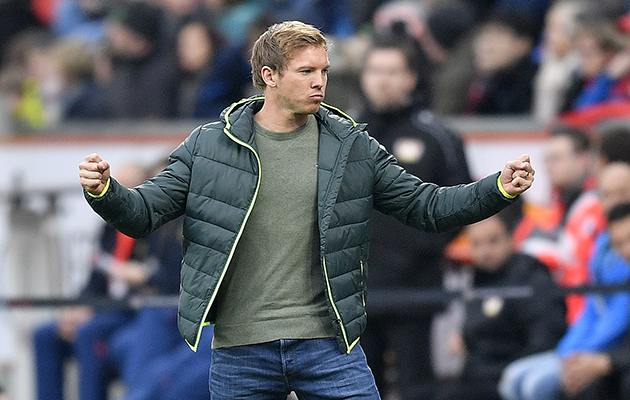No matter that Julian Nagelsmann’s Hoffenheim have been treading in treacle recently, winning only three of their last 13 competitive matches. The 30-year-old Bavarian very much remains the Golden Boy of German coaches, widely-expected to one day rule the roost at Bayern Munich and now thought to be a serious contender for the Dortmund hot-seat.
With the Ruhr giants in an autumnal tail-spin and “Trainer” Peter Bosz increasingly cutting the figure of the lame duck politician who is in office but not in power, the Dortmunder top brass apparently have identified wunderkind Nagelmann as the long-term answer to their prayers.
Well aware that Hoffenheim are most unlikely to allow Nagelsmann to leave mid-way through the campaign, Dortmund may be tempted to plough the caretaker furrow, to appoint an experienced “safe pair of hands” until the end of the season.
Possible interim incumbents include Armin Veh – a national champion with Stuttgart in 2016-17 – DFB technical director Horst Hrubesch and ex-Leverkusen and Hamburg boss Bruno Labbadia.
What an impact Nagelsmann has made on the German game since taking over at Hoffenheim less than two years ago, not only transforming a floundering, dispirited group into a top-four side, but doing so in such an unfussy, perceptive way.
Renowned for his innovation on the training ground, his tactical flair and considerable powers of motivation, Nagelsmann is indeed a technical area natural. Little wonder Hoffenheim founding father Dietmar Hopp puts him “on a par with a Mourinho, Klopp or Guardiola”.
That said, the Hoffenheim boy wonder certainly has had his difficulties this autumn, his team limp and lifeless in the Europa League and showing signs of fragility on the Bundesliga front too. Inconsistent, defensively sloppy and not nearly as clinical in front of goal as they were last term.
To a large extent, Nagelsmann has been toiling against factors beyond his control. A lengthy injury list, a squad too shallow to compete on multiple fronts and players totally out of form, notably Croat forward Andrej Kramaric and newly-arrived Norwegian centre-back Havard Nordtveit.
It’s also as clear as day that the All-Blues are still paying the price for Bayern Munich’s summertime swoop for stopper Niklas Sule and midfield linker Sebastian Rudy. The pair of German internationals were the heart and soul of the Hoffenheim operation and simply have not been adequately replaced.
“I like to be honest in what I have to say and have to admit we’re in a results crisis,” declared Nagelsmann after a recent 3-0 thumping at Hamburg. “We cannot live off what’s happened in the past. We have to get back to reality.”
Seven days later, he had the reaction he was looking for: the 4-0 scalp of high-flying RB Leipzig. The good and the gifted don’t tend to stay down for long.
What We’ve Learned This Week
1. Over and out.
The Köln power-that-be resisted for as long as they could. But after 14 winless Bundesliga games, finally had to go nuclear, deposing long-suffering coach Peter Stöger. In a peculiar twist of fate, the latter’s last game in charge was the Billy-Goats’ best league performance of the season, twice coming from behind to secure an excellent 2-2 draw at Schalke. Stöger was in charge at the RheinEnergieStadion for four-and-a-half years, an eternity at a club notorious for hiring and firing at the drop of a hat.
2. Travelling bright.
It’s official. Eintracht Frankfurt currently are the number one road team in the top-flight. Thanks to a 2-1 win at Hertha Berlin, the Eagles have now picked 15 points from eight away games. Better than league leaders Bayern. Better than RB Leipzig, Dortmund and Schalke. Built to soak up pressure and counter-attack, Eintracht are not enjoying themselvelves nearly as much on their own Waldstadion patch, only winning twice in six attempts. “We have problems when the opposition sit back and hand us the initiative, but that’s not a fault exclusive to us,” explained Frankfurt coach Niko Kovac. “I think 80 per cent of Bundesliga teams fall into this category.”






